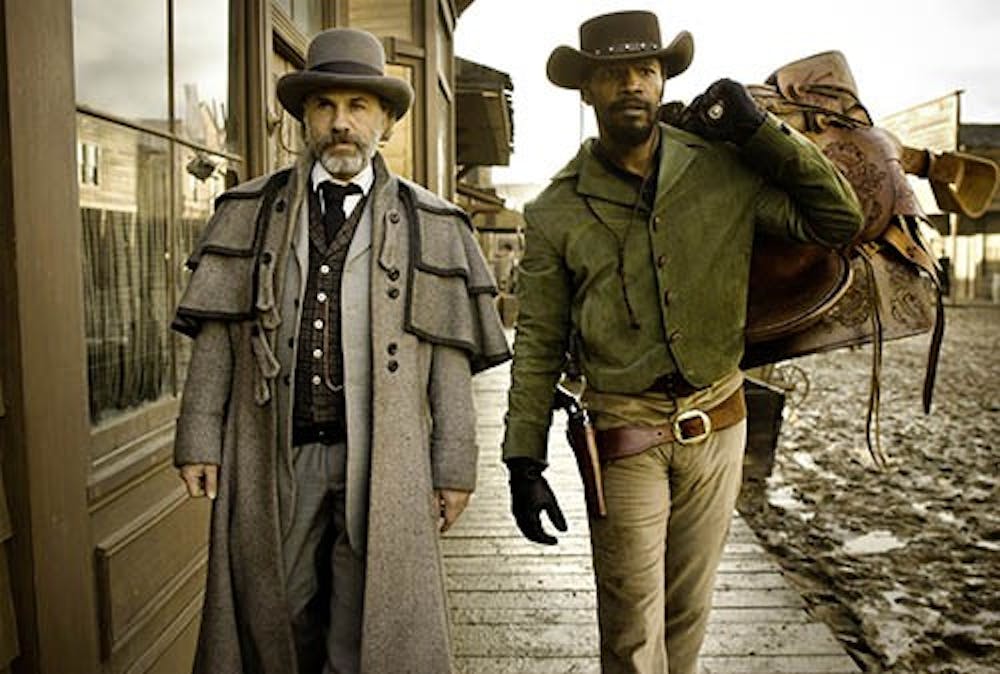Kameron McBride writes a column for the Daily News. His views and opinions don’t necessarily agree with those of the newspaper or The Daily.
For a while I avoided going to see “Django Unchained.” Simply, I was worried about seeing director Quentin Tarantino’s take on the Civil War, fearing that his distinct style would overtake any sort of larger point the film was trying to make. After I saw “Django,” it took me a while to organize my thoughts about it. If nothing else, Tarantino has created a provocative dialogue, but I’m not sure if he’s going about it in the right way.
The film starts with two slavers leading Django (Jamie Foxx) and other slaves through the woods. They run into a dentist named Dr. King Schultz (Christopher Waltz) who frees Django after learning he has information on slavers that Schultz is hunting. Schultz is a bounty hunter, masquerading as a dentist, who goes from town to town killing people for the U.S. government.
Following Django and Schultz making their rounds through different towns was easily the most enjoyable part of the film. It’s a buddy film where race roles become reversed as Django quickly evolves into what Schultz dubs “the fastest gun in the South.” Typically the black sidekick will help the white main character toward his goal, but the narrative shifts from Django and Schultz trying to hunt bounties to them trying to free Django’s wife Broomhilda (Kerry Washington) who is being held at Candieland, a plantation run by the nefarious Calvin Candie (Leonardo Dicaprio).
Calvin himself is a monster who watches “Mandingo Fighting,” a gladiator–style sport where two slaves fight to the death. Joining Calvin is his house slave Stephen (Samuel L. Jackson) who is the Uncle Tom of the story. Stephen is a slave who is willing to betray his own race in order to gain favor.
Once we reach Candieland, all sense of pacing is lost. The film drags unbelievably, and it seems like we hit at least two or three climaxes during this section. This film lacks Tarantino’s ability to bend a narrative to his will and I think it may be his worst constructed film.
The scenes with Stephen and Calvin feel like a wasted opportunity to explore an interesting relationship. The fact that Stephen can somewhat exert influence over Calvin is interesting, as is the fact that Stephen essentially betrays his race in order to gain this power. The relationship between Stephen and Django is also interesting but too often Tarantino’s overbearing impulses interrupt these moments, like an ugly monster devouring everything significant the film might have to say.
This is never more apparent than the depiction of Mandingo Fighting in the film, which never existed. Of the several articles I’ve read, it seems there is no record of these sorts of matches. The only real record of Mandingo Fighting is it occurs in a few exploitation films of which Tarantino is so fond but few filmgoers are aware of.
So why include Mandingo Fighting in the film? The scene of the slaves fighting is incredibly violent and hard to watch, enough that it eclipses any other violence in a Tarantino film. What possible service could these scenes serve? It can’t be to make Candie any eviler; his nature as a slave owner makes him plenty evil enough. The only reason I can think of is for Tarantino to give the audience something else to jump at, something else to catch their eye.
Tarantino said he wanted to make this movie to “give black American males a Western hero,” which is a noble cause. But “Django Unchained” tries to have its cake and eat it too in terms of its own importance. It wants to create a dialogue on racism and slavery while at the same time being set in a fantasy world of cartoonish violence and altered history. If you really wanted to create a dialogue on slavery and racism, why make these choices?
Despite that I think the film is wrong in how it delivers its message, at least it brings a dialogue of slavery to the table, and it should be commended for that. However, once we are at the table, I don’t think we get very far. The movie is intriguing and entertaining, at least for its first half. For that alone I can recommend going to see it; I just can’t predict what your reaction is quite going to be.


